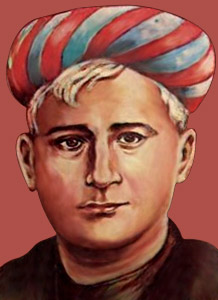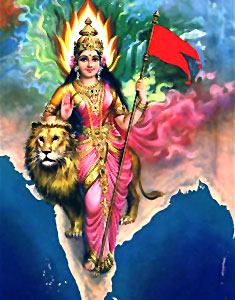`Vande Mataram`, these two words impresses upon every Indian as the most blood-boiling, resounding and haunting word ever to be used in Indian independence movement and `swaraj`. The tremendous outcry of  Vande Mataram in the innumerable crusading voices, perhaps had touched every Indian sitting back in their homes with a different view to life. Quite naturally, this magical term goes long back in history, with an illustrious lineage of production. This was and still is considered the national song of India, bearing a distinctness of itself, quite different from the national anthem of India "Jana Gana Mana". The Vande Mataram song was composed by Bankim Chandra Chatterjee in a special dialect of Bengali and Sanskrit. The Indian National Congress session of 1896 was the first political instance where this song was sung.
Vande Mataram in the innumerable crusading voices, perhaps had touched every Indian sitting back in their homes with a different view to life. Quite naturally, this magical term goes long back in history, with an illustrious lineage of production. This was and still is considered the national song of India, bearing a distinctness of itself, quite different from the national anthem of India "Jana Gana Mana". The Vande Mataram song was composed by Bankim Chandra Chatterjee in a special dialect of Bengali and Sanskrit. The Indian National Congress session of 1896 was the first political instance where this song was sung.
The song Vande Mataram was, on the one hand, popularly acclaimed as India`s national song and on the other, it has given rise to intense contestation on account of objections raised on the ground of its imagery and rhetoric and an implicit idolatry. Written sometime during the early 1870s, the original version, a lyrical vandana, or hymn, remained unpublished for some years. In 1881, Vande Mataram was included in the novel Anandamath. In an expanded version the poem was endowed with militant Hindu accoutrement in the context of the novel. Thus Bankim Chandra Chatterjee created a new icon, the motherland.
The popularity of Vande Mataram supported in the construction of Indian national identity. The slogan Vande Mataram has been widely acknowledged to bring Vande Mataram, the song into the forefront. The historical association of Vande Mataram with the nationalist movement gradually made it `a living and inseparable part of the nationalist movement` whilst portraying the popularity of Vande Mataram. It is therefore undeniable that Vande Mataram`s widespread appeal and popularity and its hold on public sentiment is still unprecedented.
The imagery used in Vande Mataram further supported the popularity of the song. The poem Vande Mataram had been a lyrical ode to the motherland, `giver of bliss, richly watered and richly fruited, clad in blossoming foliage, sweet of laughter, sweet of speech` and strong in having seventy million sons to defend her. This can somewhat account for the tremendous popularity of Vande Mataram down the ages.
In 2003, BBC World Service carried on an international poll to choose ten most celebrated songs of all time. Approximately 7000 songs qualified in the selections from around the world. According to BBC, people spanning 155 countries and island voted Vande Mataram as second amongst the top 10 songs.
History of Vande Mataram, Indian National Song
History of Vande Mataram is as varying in itself, as it was when it was composed, under curious circumstances. It is said that Bankim Chandra Chatterjee had composed his legendary poem when he was serving under the British government. The song was written sometime around late 19th century, amidst huge disputes of its being published. Vande Mataram was finally included in Bankim Chandra`s novel, Anandamath. The poem, with its enriched historical evolvement, had turned into an emblematic phrase, hyperbolising motherland, taken up as the unmatched cry for freeing India.
Vande Mataram in Pre-independent Society, Indian National Song
Vande Mataram and its impact in pre-independent society were sublime. For, the more is said about the song, the less it sounds. These two words had a strange kind of driving, magical impact upon every fighter, dreaming for an India, free from British supremacy. As such, Vande Mataram could then be heard from very alley, with chants resounding into every soul. Although, it was not free from its own type of dispute. Political and religious controversies pivoting around Vande Mataram sprang up from that stratum of society, which were critical towards Bankim Chandra in general. Whatever the fact was, Vande Mataram during pre-independence was successful to create ripples within minds worried for future India.
Effects of Vande Mataram in Pre-independent Society, Indian National Song
Effects of Vande Mataram in pre-independent society bore a distinct picture of its own. The times post 1900 can be called the perfect time, when Vande Mataram affected upon a pan-Indian society as a whole. Every protest march, every gathering, every cry quoted those two special words. The British were in fact, hugely intimidated by Vande Mataram and its effect on young men, several choosing to drop out of colleges. Native protests were hurled against British population in general, however, with the style of protest differing from class to class. The educative class, the working class, the middle class had an inventive style of protesting against the masters, in the process redefining effects of Vande Mataram in pre-independent India.
 Composition of Vande Mataram, Indian National Song
Composition of Vande Mataram, Indian National Song
Composition of Vande Mataram implicitly bears Bankim Chandra Chatterjee`s own style of thought in written version. Several theories are put forward for the poem`s composition. The poem was originally composed in a comparatively smaller version, which was later enlarged to include in the novel, Anandamath. Aurobindo Ghosh had very justly translated the poem for the sake of discussion. Bankim Chandra composed Vande Mataram using both Sanskrit and Bengali, overlapping according to his own disposal. This was open to much criticism later, but, however, stood its ground. Bankim Chandra, by using his intellect in the poem, was merely trying to mirror the contemporary times, and to some extent also eliciting autobiographical elements all through.
Imagery in Vande Mataram, Indian National Song
Imagery in Vande Mataram abounds throughout the poem, which gives room for sufficient interpretations in symbolism. Firstly, the motherland is hugely personified as Mother or Bharat Mata, which mostly resound in every single line. This very image calls for interpretations along with others invoked by Bankim Chandra. The `seven crore` population count is yet another area, which derives importance in imageries in Vande Mataram.
Impact of Vande Mataram, Indian National Song
Impact of Vande Mataram in the pre-independent India was incredible and tumultuous, owing to the sentiment that was applied in the core of the slogan. The overriding impact that came over was that Vande Mataram was subject to disagreements and discordant amongst the group of fighters. Society did become divided in eliciting the cry honouring Motherland. The socio-political times were significantly changed when Vande Mataram started its fulfilling journey towards achieving independence.













